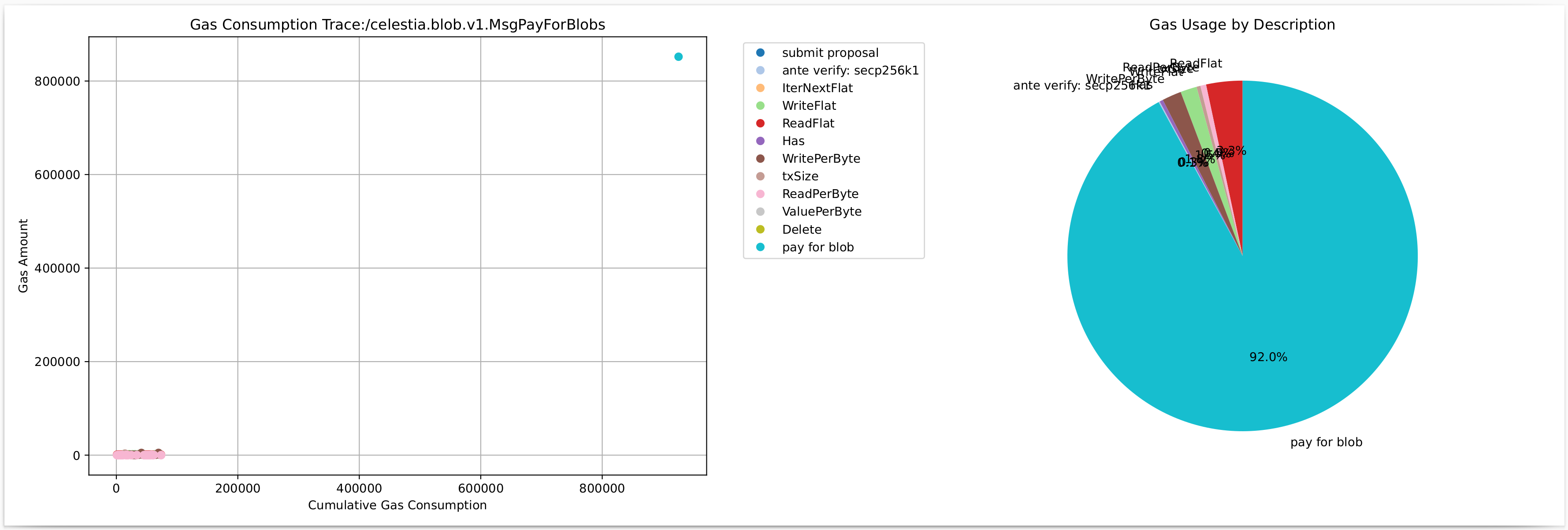Resource Pricing
For all standard cosmos-sdk transactions (staking, IBC, etc), Celestia utilizes the default cosmos-sdk mechanisms for pricing resources. This involves incrementing a gas counter during transaction execution each time the state is read from/written to, or when specific costly operations occur such as signature verification or inclusion of data.
// GasMeter interface to track gas consumption
type GasMeter interface {
GasConsumed() Gas
GasConsumedToLimit() Gas
GasRemaining() Gas
Limit() Gas
ConsumeGas(amount Gas, descriptor string)
RefundGas(amount Gas, descriptor string)
IsPastLimit() bool
IsOutOfGas() bool
String() string
}
We can see how this gas meter is used in practice by looking at the store. Notice where gas is consumed each time we write or read, specifically a flat cost for initiating the action followed by a prorated cost for the amount of data read or written.
// Implements KVStore.
func (gs *Store) Get(key []byte) (value []byte) {
gs.gasMeter.ConsumeGas(gs.gasConfig.ReadCostFlat, types.GasReadCostFlatDesc)
value = gs.parent.Get(key)
// TODO overflow-safe math?
gs.gasMeter.ConsumeGas(gs.gasConfig.ReadCostPerByte*types.Gas(len(key)), types.GasReadPerByteDesc)
gs.gasMeter.ConsumeGas(gs.gasConfig.ReadCostPerByte*types.Gas(len(value)), types.GasReadPerByteDesc)
return value
}
// Implements KVStore.
func (gs *Store) Set(key []byte, value []byte) {
types.AssertValidKey(key)
types.AssertValidValue(value)
gs.gasMeter.ConsumeGas(gs.gasConfig.WriteCostFlat, types.GasWriteCostFlatDesc)
// TODO overflow-safe math?
gs.gasMeter.ConsumeGas(gs.gasConfig.WriteCostPerByte*types.Gas(len(key)), types.GasWritePerByteDesc)
gs.gasMeter.ConsumeGas(gs.gasConfig.WriteCostPerByte*types.Gas(len(value)), types.GasWritePerByteDesc)
gs.parent.Set(key, value)
}
The configuration for the gas meter used by Celestia is as follows.
// KVGasConfig returns a default gas config for KVStores.
func KVGasConfig() GasConfig {
return GasConfig{
HasCost: 1000,
DeleteCost: 1000,
ReadCostFlat: 1000,
ReadCostPerByte: 3,
WriteCostFlat: 2000,
WriteCostPerByte: 30,
IterNextCostFlat: 30,
}
}
// TransientGasConfig returns a default gas config for TransientStores.
func TransientGasConfig() GasConfig {
return GasConfig{
HasCost: 100,
DeleteCost: 100,
ReadCostFlat: 100,
ReadCostPerByte: 0,
WriteCostFlat: 200,
WriteCostPerByte: 3,
IterNextCostFlat: 3,
}
}
Two notable gas consumption events that are not Celestia specific are the total bytes used for a transaction and the verification of the signature
func (cgts ConsumeTxSizeGasDecorator) AnteHandle(ctx sdk.Context, tx sdk.Tx, simulate bool, next sdk.AnteHandler) (sdk.Context, error) {
sigTx, ok := tx.(authsigning.SigVerifiableTx)
if !ok {
return ctx, sdkerrors.Wrap(sdkerrors.ErrTxDecode, "invalid tx type")
}
params := cgts.ak.GetParams(ctx)
ctx.GasMeter().ConsumeGas(params.TxSizeCostPerByte*sdk.Gas(len(ctx.TxBytes())), "txSize")
...
}
// DefaultSigVerificationGasConsumer is the default implementation of SignatureVerificationGasConsumer. It consumes gas
// for signature verification based upon the public key type. The cost is fetched from the given params and is matched
// by the concrete type.
func DefaultSigVerificationGasConsumer(
meter sdk.GasMeter, sig signing.SignatureV2, params types.Params,
) error {
pubkey := sig.PubKey
switch pubkey := pubkey.(type) {
case *ed25519.PubKey:
meter.ConsumeGas(params.SigVerifyCostED25519, "ante verify: ed25519")
return sdkerrors.Wrap(sdkerrors.ErrInvalidPubKey, "ED25519 public keys are unsupported")
case *secp256k1.PubKey:
meter.ConsumeGas(params.SigVerifyCostSecp256k1, "ante verify: secp256k1")
return nil
case *secp256r1.PubKey:
meter.ConsumeGas(params.SigVerifyCostSecp256r1(), "ante verify: secp256r1")
return nil
case multisig.PubKey:
multisignature, ok := sig.Data.(*signing.MultiSignatureData)
if !ok {
return fmt.Errorf("expected %T, got, %T", &signing.MultiSignatureData{}, sig.Data)
}
err := ConsumeMultisignatureVerificationGas(meter, multisignature, pubkey, params, sig.Sequence)
if err != nil {
return err
}
return nil
default:
return sdkerrors.Wrapf(sdkerrors.ErrInvalidPubKey, "unrecognized public key type: %T", pubkey)
}
}
Since gas is consumed in this fashion and many of the cosmos-sdk transactions are composable, any given transaction can have a large window of possible gas consumption. For example, vesting accounts use more bytes of state than a normal account, so more gas is consumed each time a vesting account is read from or updated.
Parameters
There are four parameters that can be modified via governance to modify gas usage.
| Parameter | Default Value | Description | Changeable via Governance |
|---|---|---|---|
| consensus/max_gas | -1 | The maximum gas allowed in a block. Default of -1 means this value is not capped. | True |
| auth/tx_size_cost_per_byte | 10 | Gas used per each byte used by the transaction. | True |
| auth/sig_verify_cost_secp256k1 | 1000 | Gas used per verifying a secp256k1 signature | True |
| blob/gas_per_blob_byte | 8 | Gas used per byte used by blob. Note that this value is applied to all encoding overhead, meaning things like the padding of the remaining share and namespace. See PFB gas estimation section for more details. | True |
Gas Limit
The gas limit must be included in each transaction. If the transaction exceeds this gas limit during the execution of the transaction, then the transaction will fail.
Note: When a transaction is submitted to the mempool, the transaction is not fully executed. This can lead to a transaction getting accepted by the mempool and eventually included in a block, yet failing because the transaction ends up exceeding the gas limit.
Fees are not currently refunded. While users can specify a gas price, the total fee is then calculated by simply multiplying the gas limit by the gas price. The entire fee is then deducted from the transaction no matter what.
Fee market
By default, Celestia's consensus nodes prioritize transactions in their mempools
based on gas price. In version 1, there was no enforced minimum gas price, which
allowed each consensus node to independently set its own minimum gas price in
app.toml. This even permitted a gas price of 0, thereby creating the
possibility of secondary markets. In version 2, Celestia introduces a network
minimum gas price, a consensus constant, unaffected by individual node
configurations. Although nodes retain the freedom to increase gas prices
locally, all transactions in a block must be greater than or equal to the network
minimum threshold. If a block is proposed that contains a tx with a gas price
below the network min gas price, the block will be rejected as invalid.
Estimating PFB cost
Generally, the gas used by a PFB transaction involves a static "fixed cost" and a dynamic cost based on the size of each blob involved in the transaction.
Note: For a general use case of a normal account submitting a PFB, the static costs can be treated as such. However, due to the description above of how gas works in the cosmos-sdk this is not always the case. Notably, if we use a vesting account or the
feegrantmodules, then these static costs change.
The "fixed cost" is an approximation of the gas consumed by operations outside
the function GasToConsume (for example, signature verification, tx size, read
access to accounts), which has a default value of 65,000.
Note: the first transaction sent by an account (sequence number == 0) has an additional one time gas cost of 10,000. If this is the case, this should be accounted for.
Each blob in the PFB contributes to the total gas cost based on its size. The
function GasToConsume calculates the total gas consumed by all the blobs
involved in a PFB, where each blob's gas cost is computed by first determining
how many shares are needed to store the blob size. Then, it computes the product
of the number of shares, the number of bytes per share, and the gasPerByte
parameter. Finally, it adds a static amount per blob.
The gas cost per blob byte and gas cost per transaction byte are parameters that could potentially be adjusted through the system's governance mechanisms. Hence, actual costs may vary depending on the current settings of these parameters.
Tracing Gas Consumption
This figure plots each instance of the gas meter being incremented as a colored dot over the execution lifecycle of a given transaction. The y-axis is units of gas and the x-axis is cumulative gas consumption. The legend shows which color indicates what the cause of the gas consumption was.
This code used to trace gas consumption can be found in the tools/gasmonitor of the branch for #2131, and the script to generate the plots below can be found here (warning: this script will not be maintained).
MsgSend
Here we can see the gas consumption trace of a common send transaction for
1utia
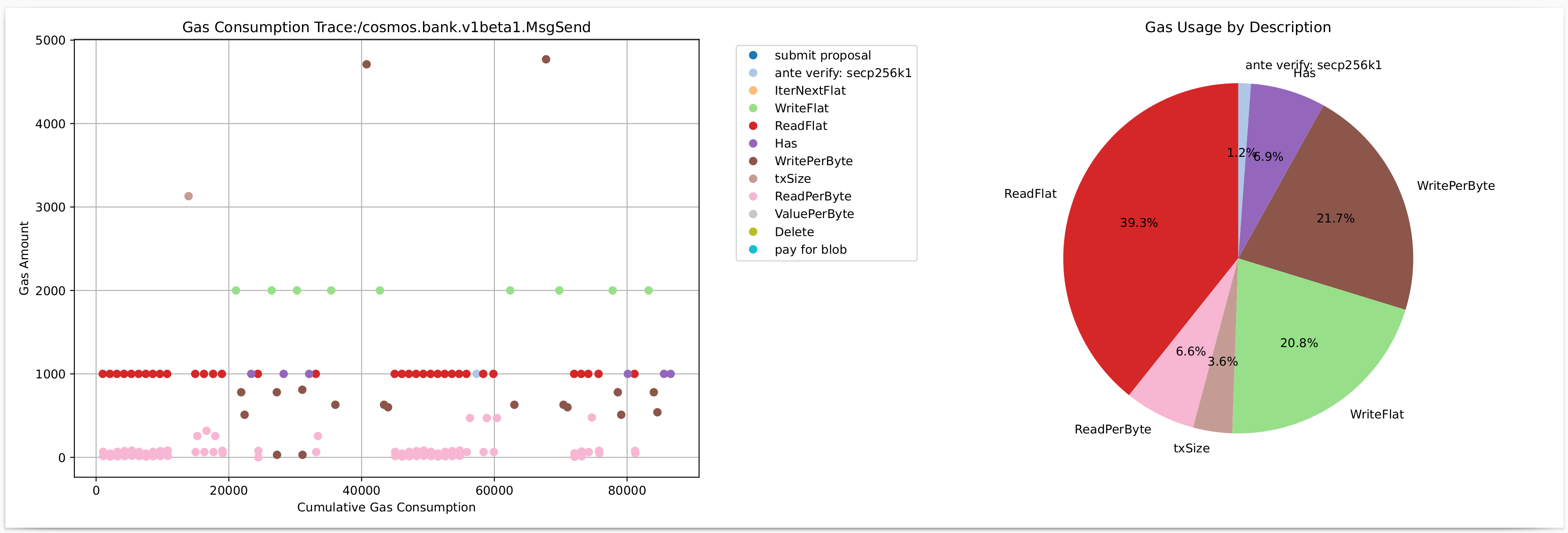
MsgCreateValidator
Here we examine a more complex transaction.
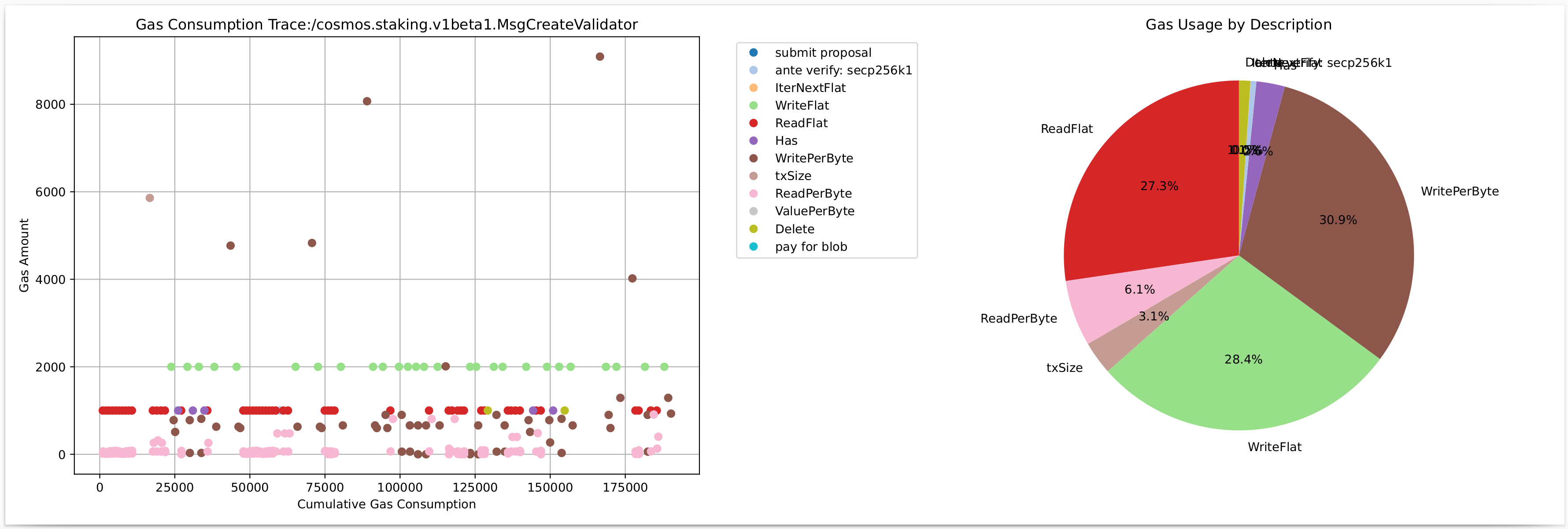
PFB with One Single Share Blob
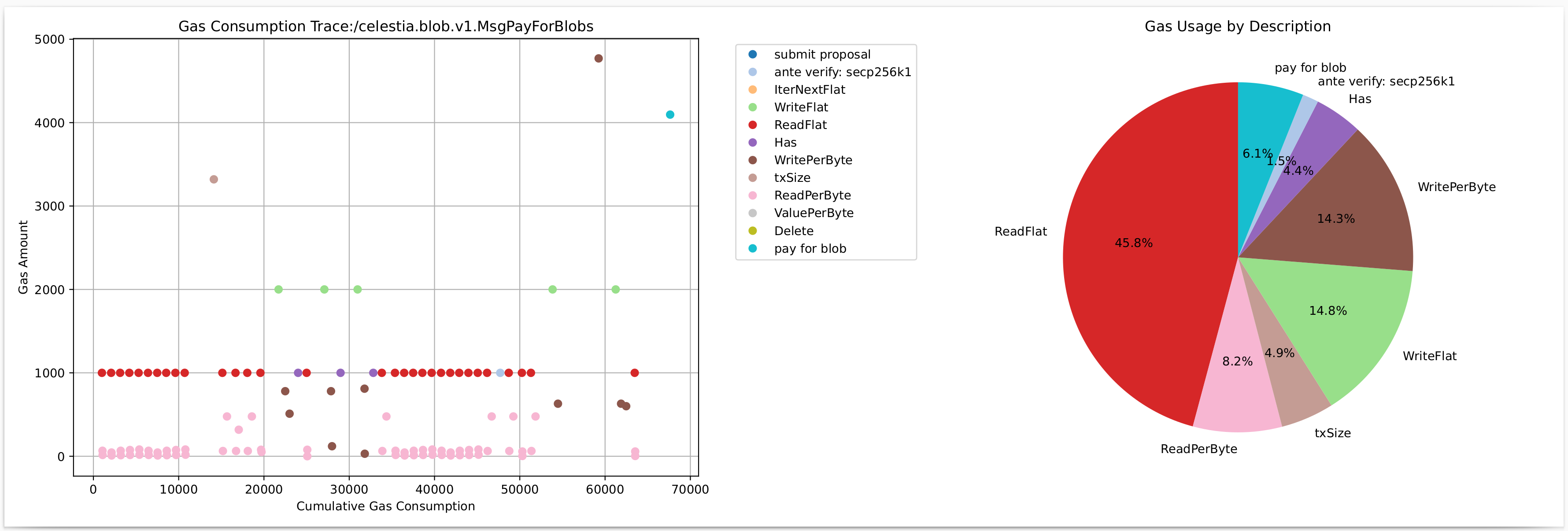
PFB with Two Single Share Blobs
This PFB transaction contains two single share blobs. Notice the gas cost for
pay for blob is double what it is above due to two shares being used, and
there is also additional cost from txSize since the transaction itself is
larger to accommodate the second set of metadata in the PFB.
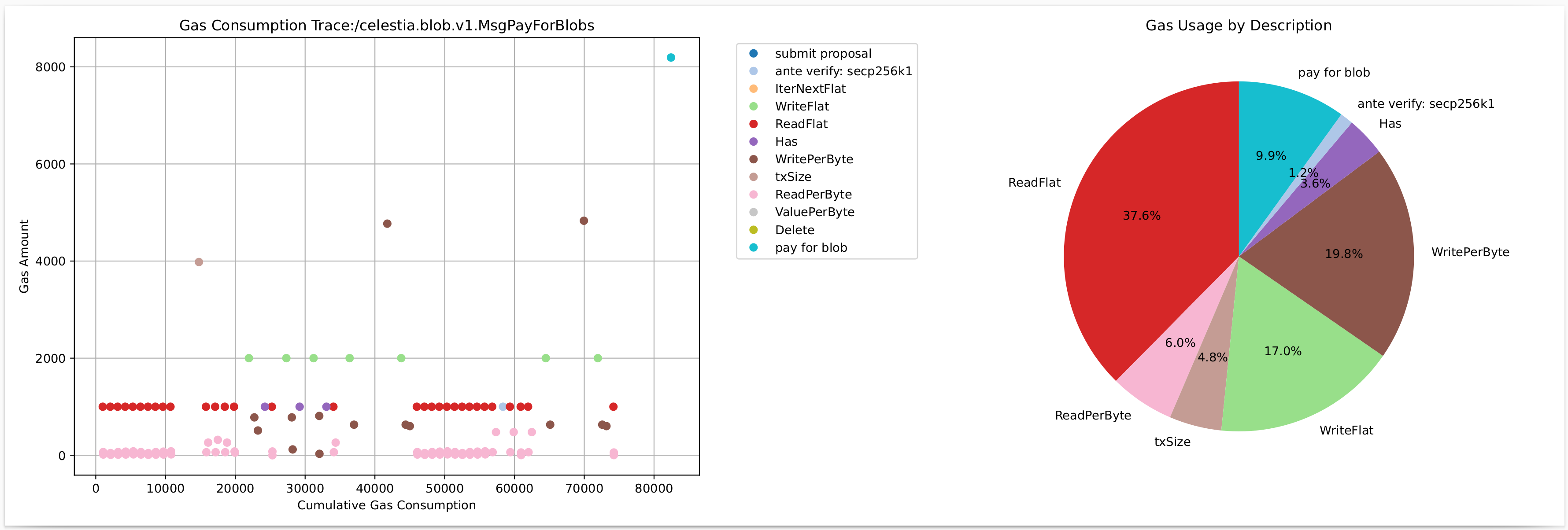
100KiB Single Blob PFB
Here we can see how the cost of a PFB with a large blob (100KiB) is quickly dominated by the cost of the blob.
